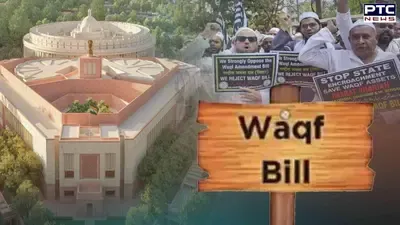
PTC Web Desk: The Central Government has submitted a caveat to the Supreme Court, requesting to be heard before any decisions are made on petitions contesting the constitutional validity of the Waqf (Amendment) Act, 2025. The move follows a series of legal petitions filed against the newly enacted law, which received Presidential assent on April 5 after heated debates in Parliament.
The Waqf (Amendment) Bill, 2025, was passed in the Rajya Sabha following a 13-hour-long debate, securing 128 votes in favour and 95 against. A day earlier, the Lok Sabha had cleared the Bill with 288 members backing it and 232 opposing. Opposition parties strongly criticised the Bill, terming it “anti-Muslim” and “unconstitutional,” while the government maintained it as a “historic reform” for the minority community.
In addition to this, Parliament also approved the Mussalman Wakf (Repeal) Bill, 2025, which repeals the Mussalman Wakf Act of 1923. Both laws came into force following the President’s assent and subsequent government notification.
Several legal challenges have been filed before the Supreme Court. Congress MP Mohammad Jawed, AIMIM president Asaduddin Owaisi, and AAP MLA Amanatullah Khan are among the prominent petitioners contesting the Waqf (Amendment) Act.
Jawed, representing Kishanganj, Bihar, and a former member of the Joint Parliamentary Committee on the Bill, argued that the law imposes "arbitrary" constraints on Waqf properties, allegedly infringing on the religious freedom and autonomy of Muslims. He also highlighted discriminatory treatment in comparison to other religious endowments and limitations on establishing Waqfs based on the duration of religious practice.
In his petition, Owaisi claimed that the Act removes protections granted to other religious and charitable institutions, thereby violating Articles 14 and 15 of the Constitution. Khan's plea also questioned the Act’s validity, alleging it breaches Articles 14, 15, 21, 25, 26, 29, 30, and 300-A of the Constitution, calling for it to be struck down.
The Association for Protection of Civil Rights (APCR), an NGO, has also moved the apex court challenging the law’s constitutional merit. Furthermore, the Rashtriya Janata Dal (RJD) announced its legal opposition, with Rajya Sabha MP Manoj Jha and leader Fayaz Ahmed filing a petition representing the party.
With the Centre filing its caveat, the Supreme Court is expected to hear all sides before issuing any interim relief or decision.